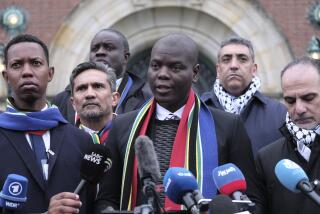NATO Attacks on Serb Targets
- Share via
In “The Serbs Asked for It” (Commentary, Sept. 1), William Pfaff argues that the Serbs could have taken their case to the “international community.” He claims that international sympathy was somewhat in favor of the Serbs before the war. But the fact is that the so-called “international community,” in the form of the United Nations, blithely ignored the Serbs and proceeded with the breakup of Yugoslavia, thus creating the conditions that made this war virtually inevitable.
Pfaff comments, “No shortage exists of Croatian and Bosnian atrocities in the course of this war.” The Western press has demonstrated no interest whatever in pursuing such stories. The Serbs cannot move without creating headlines.
Consider that the Serbs were widely condemned for ethnic cleansing, then consider that the recent Croatian attack created 250,000 Serbian refugees. The Croats dropped 3,000 shells on Knin (an attack on civilians) without the slightest complaint from the West. The Serbs land one shell in Sarajevo and all the forces of NATO come down on them.
Can anyone explain how NATO’s jurisdiction was extended to Bosnia?
ROBERT D. SEXTON
Newhall
*
* Pfaff’s remark that he “felt a justified relief and even vengeful pleasure” is indeed sick. Pfaff and The Times neglected to inform your readers that on Aug. 28, the day before the NATO bombing, the Muslim forces in Sarajevo launched an artillery shell into the front of the St. Sava Serbian Orthodox church as a wedding was taking place, killing Jadranka Vitor, a 30-year-old woman, and seriously wounding 48 Serbian civilians, including the parish priest. Apparently, the U.N. outrage against the violation of Sarajevo’s safe area does not include the Serbian section!
Missing, too, from this article were any references that Bosnian Muslim forces joined in concert with the rapid-reaction force in attacking and destroying 15 Serbian villages in the area of Blazuj and Nevesinje. These attacks were outside of the 12-mile range of Sarajevo and were launched against Serbian hospitals, churches and schools.
U.N. High Commissioner for Refugees and International Red Cross sources released documents on Aug. 28 that say more than 10,000 Krajina Serbs are missing from the Aug. 5 Croatian offensive. Does Pfaff dance on graves too?
WILLIAM DORICH, President
Serbian American Voters Alliance
Los Angeles
*
* Re “A Tribunal in a Time of Atrocities,” Aug. 30: War crimes tribunal prosecutor Richard Goldstone says that “we have to bring home that there is some [wartime] conduct which is beyond the pale.” Anything to do with war is a war crime. When a country or group starts a war, they are the criminals we need to find.
An international tribunal should have been existing for more than 50 years, since the end of World War II. The world is being victimized by the horrendous scenes shown on TV every day, showing how people are suffering in the war-zone countries. We should do more to avoid these situations.
If Dusan Tadic is not sentenced to life in prison or worse, justice as we know it is nothing more than water under the bridge.
SERGIO SOUZA
Los Angeles
*
* As a foreign service officer just returned from three years at the U.S. Embassy in Croatia, I can agree with Robert Dallek’s observation (Opinion, Aug. 27) that “personal contacts are an essential ingredient of successful negotiations.” However, it is regrettable that such a distinguished historian should have overlooked the vital role of those career diplomats who have worked tirelessly--and frequently in harm’s way--to bring peace to the Balkans.
For every successful negotiation, a “home team” of professional diplomats has labored assiduously to create an atmosphere conducive to an agreement.
The most recent case is in Croatia, where U.S. Ambassador Peter W. Galbraith has worked hard over the past two years to build contacts--and the resulting insights--with Croatians from all walks of life, taxi drivers to the president of the country. In part because of these contacts Galbraith played a key role--most observers agree--in bringing about the 1994 Washington Agreement, which stopped the Croat-Muslim conflict in Bosnia-Herzegovina. This agreement also formed the cornerstone of the Contact Group plan now being negotiated.
Galbraith was not alone in these efforts--he was supported by a team of foreign service professionals, with language skills, years of service in the region and the “personal contacts” and “chemistry” that Dalleck applauds.
SUSAN CRAIS HOVANEC
Washington
*
* A bit of history may help to explain the behavior of the Bosnian Serbs. They remember it, even if we don’t. I quote without comment from my 1960 copy of the Encyclopedia Britanica, describing the German occupation of the region in the war years of 1941-1942, when the Croats were Hitler’s allies.
“Armed resistance to the occupation began in Bosnia, and there the Croatian Fascists began a massacre of Serbs which, in the whole annals of World War II, was surpassed for savagery only by the mass extermination of Polish Jews.”
No, I am not a Serb.
H. W. LEWIS
Santa Barbara
More to Read
Sign up for Essential California
The most important California stories and recommendations in your inbox every morning.
You may occasionally receive promotional content from the Los Angeles Times.













